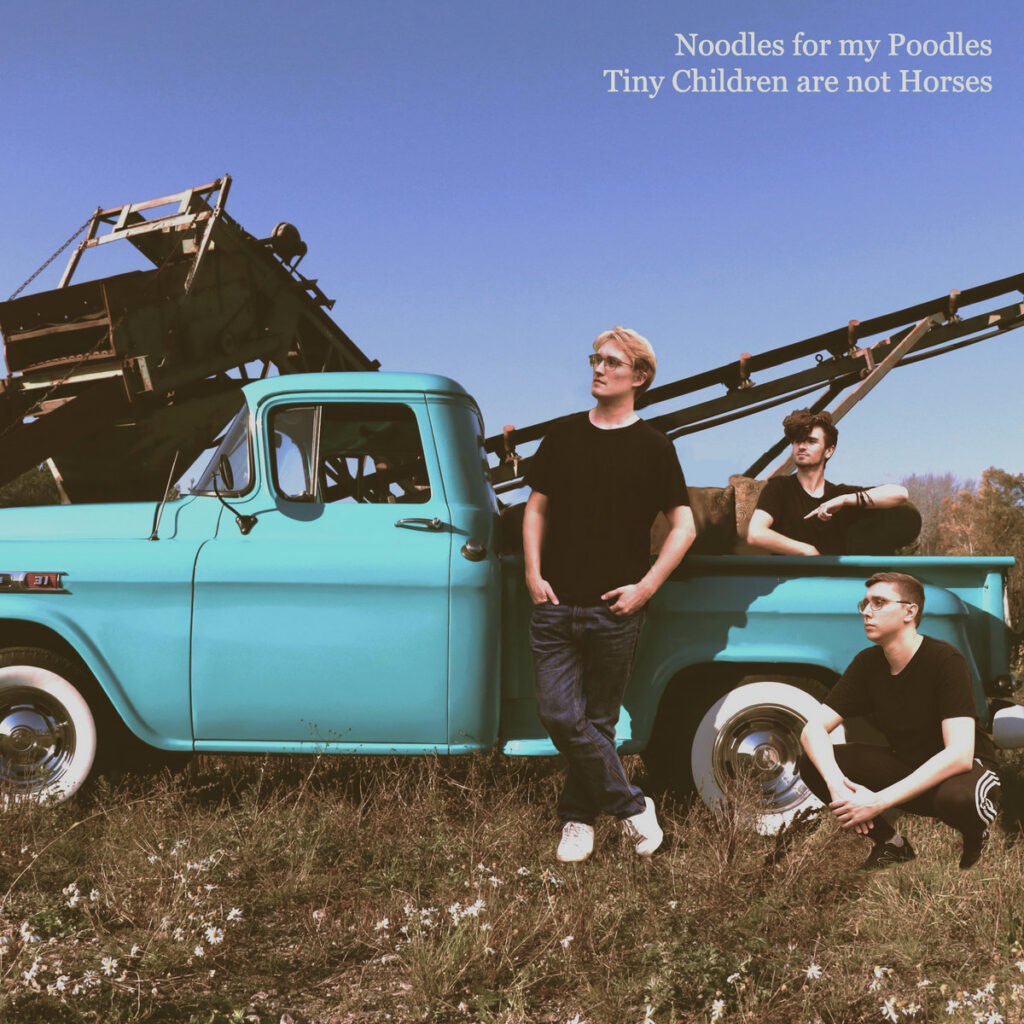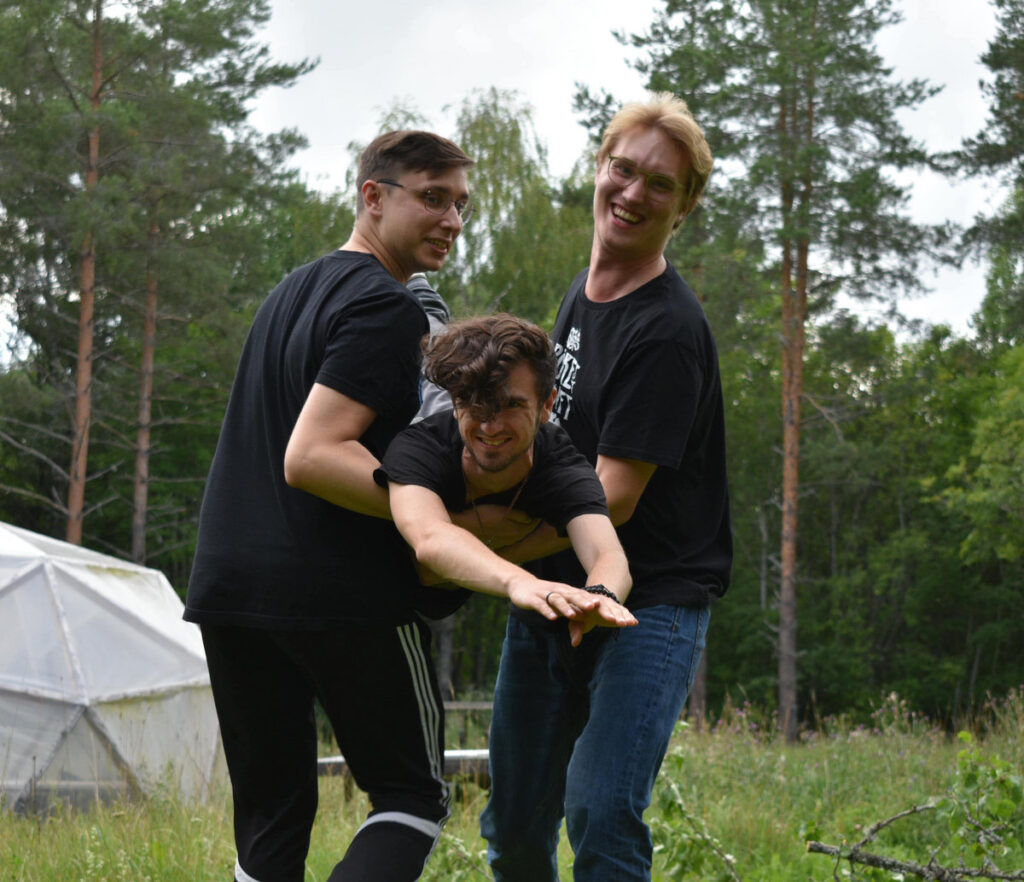Swedish progressive rock band Noodles for My Poodles re-released their 2019 full-length debut album “Tiny Children Are Not Horses” in February this year. Following the appearance on the Progotronics XLI compilation, the band talked about the re-issue.
Noodles for My Poodles recently re-released the re-recorded, re-mixed, and re-mastered version of your debut album “Tiny Children Are Not Horses” on February 1, 2024. Can you share the motivation behind revisiting this album, and what enhancements or changes can listeners expect in this new version?
Throughout the years that we have been in this band we have always looked back on our first release and have had mixed feelings for it. For a long time we’ve felt very proud of the songs themselves but discouraged by the production and performance and wished we had given the songs more justice. After several releases we noticed that we did have the capability to perform the songs much more professionally and around the time that we noticed the five year anniversary was coming up we saw a great opportunity to redo it.
On this new version we decided to keep the original structure of the songs but at the same time add some new enhancements such as layers and new solos for each instrument while focusing on a more tight sound than previously.
The band describes itself as an instrumental rock trio with numerous groundbreaking musical experiments. Can you elaborate on the band’s unique approach to musical experimentation and how it shapes your distinctive sound?
When writing music together, we never come in with the opinion that anything is per se “wrong” and that there is always room for new ideas that exceed conventional boundaries. Musical ideas in a song structure might be off key, off tempo or even straight up random MIDI notes, but that’s totally fine by us. We don’t technically aim for it, but our songs usually end up with unconventional structures and random key changes, but at the end of the day we are always (mostly) satisfied with our compositions.

Your influences include the exploring approach of the 70s progressive rock scene. How do you infuse this vintage influence into your music, and what elements from that era do you find particularly inspiring?
Mainly for us, the 70s are not a blueprint for our music but rather an inspiration of how we should be free to improvise and express ourselves in new ways. We have great respect for the musicians of that time. Even though we don’t take direct ideas from specific songs from that era, we still utilize their spirit when coming into a creative process.
Hailing from Uppsala, Sweden, how does the Scandinavian environment and nature influence the themes or atmospheres in your music, and does it play a role in the creative process of Noodles for My Poodles?
The weather here in Sweden is not very appealing or inviting most of the time, this in turn inspires us to rather spend our time inside and create colorful music to lighten the mood. So in a way, the weather is a great source of inspiration for us and a powerful tool in our creative process.
As a trio, how do each member’s contributions shape the overall sonic landscape of the band, and how do you balance individual creativity within the collaborative framework?
When we first started off in the early days we were all in our final years of school, so we had plenty of time to hang out and write music together. Usually somebody in the band had a small idea to start off with and then together we would explore it and elaborate on it as a unit making sure that everybody’s ideas were heard. But for the last couple of years we have been located in different cities far away from each other and a regular practice each week has just not been possible. This has led us to change our approach to the compositions as now we write most of the music by ourselves and send it to the rest of the band. This has both upsides and downsides as the songs are often more elaborated and well defined, but has been lacking that simple “garage-sound” that we started off with. Now looking forward we are happy with this experience, and in a short while the whole band will be at the same location for a long time and we feel ready to combine these two methods of making music together. We feel that a balanced and creative process is ahead.
“Tiny Children Are Not Horses” is a distinctive album title. Can you shed light on the meaning or concept behind the title and how it reflects the music contained within the album?
Without getting too political, we’ll just say that the title refers to a specific esteemed figure’s quote which is an inspiring quote to say the least. The final song on the album is our musical response to this quote where we emphasize the absurdity of the statement.
The re-release of your debut album suggests a certain significance. What prompted the decision to revisit and rework this specific album, and how has the band evolved since its original release in 2019?
As we mentioned in the first question, we have always been very proud of the songs from that first creation and many songs after that release have not lived up to the purity of the debut. We have evolved tremendously since the debut after countless musical experiences as individuals that have given us more insight to the inner workings of a band. Even though we have been in different places for a long time, we still have evolved together and learned from each other. For instance, we have learned to give each other musical space and lean in on the creative process rather than trying to impress with technical skills.
Being an instrumental band, how do you convey emotions and tell stories through your music without the use of lyrics? What role does the instrumental nature play in the storytelling aspect of your compositions?
We believe that lyrics aren’t the only way to evoke a feeling in the audience since many of our great inspirations that emotionally touch us are mainly instrumental. However, we mainly focus on creating something that has meaning for us since the music we write always reflects where we are at that point of time. Our aspiration is that the audience in turn will evoke their own feelings for the music and that all we give is a blank canvas for them to fill.
Can you share some memorable moments or challenges encountered during the re-recording, re-mixing, and re-mastering process of “Tiny Children Are Not Horses”? How did this experience contribute to the evolution of the album?
In all honesty, the best memories we had from the recording sessions were the ones where we just sat down together for a break and hung out. We cooked great food and kept horsing around while blasting Meshuggah in the front yard. As we already knew what the songs were like, there was nothing for us to be nervous about. Nothing could go more wrong than it did last time around.
We feel that we have gone through this process so many times at this point and we have had several roadblocks before that we have learned from. At this point, the recipe for success is finished.
With the re-release now available, what do you hope listeners take away from the album, and how do you see Noodles for My Poodles progressing in the future, both musically and creatively?
We hope our listeners will feel encouraged to take whichever path they want, whatever others might think of them. That is certainly what we always aim to do with our music and so we hope that we inspire others to do the same.
As for the future, we are excited to start a new path though we are not certain what it will entail. We have many different approaches to musical styles in mind but nothing is set in stone, and that is what everything is about.
Are there specific tracks on “Tiny Children Are Not Horses” that hold special significance for the band or have unique stories behind their creation?
The song “Welcome, Not Ready” has always been very close to us, for several reasons. Mainly it was the first song we ever put together as a trio where everybody contributed to the arrangement and was a prosperous sign that we had potential as a group. The title of the song comes from a malfunctioning coffee machine that our drummer encountered at his high school before we had band practice which pretty much ruined the day for him.
How does the band approach live performances, and do you have any upcoming shows or tours planned to support the re-released album?
Our approach to live performances is to both cleanly perform the songs we’ve composed verbatim but at the same time leave place for improvisation. A lot of the time the location and timing shapes our performance and it makes it so that we never do the exact same show twice. We have had several different types of shows including grassroot festivals, birthday parties, taco nights, poetry slams and good old fashioned bar nights where we each time have adjusted our stage presence according to the venue. Sometimes we just walk up on stage with nothing planned and just let the Chet Happen.
For more of Noodles for My Poodles visit here.

